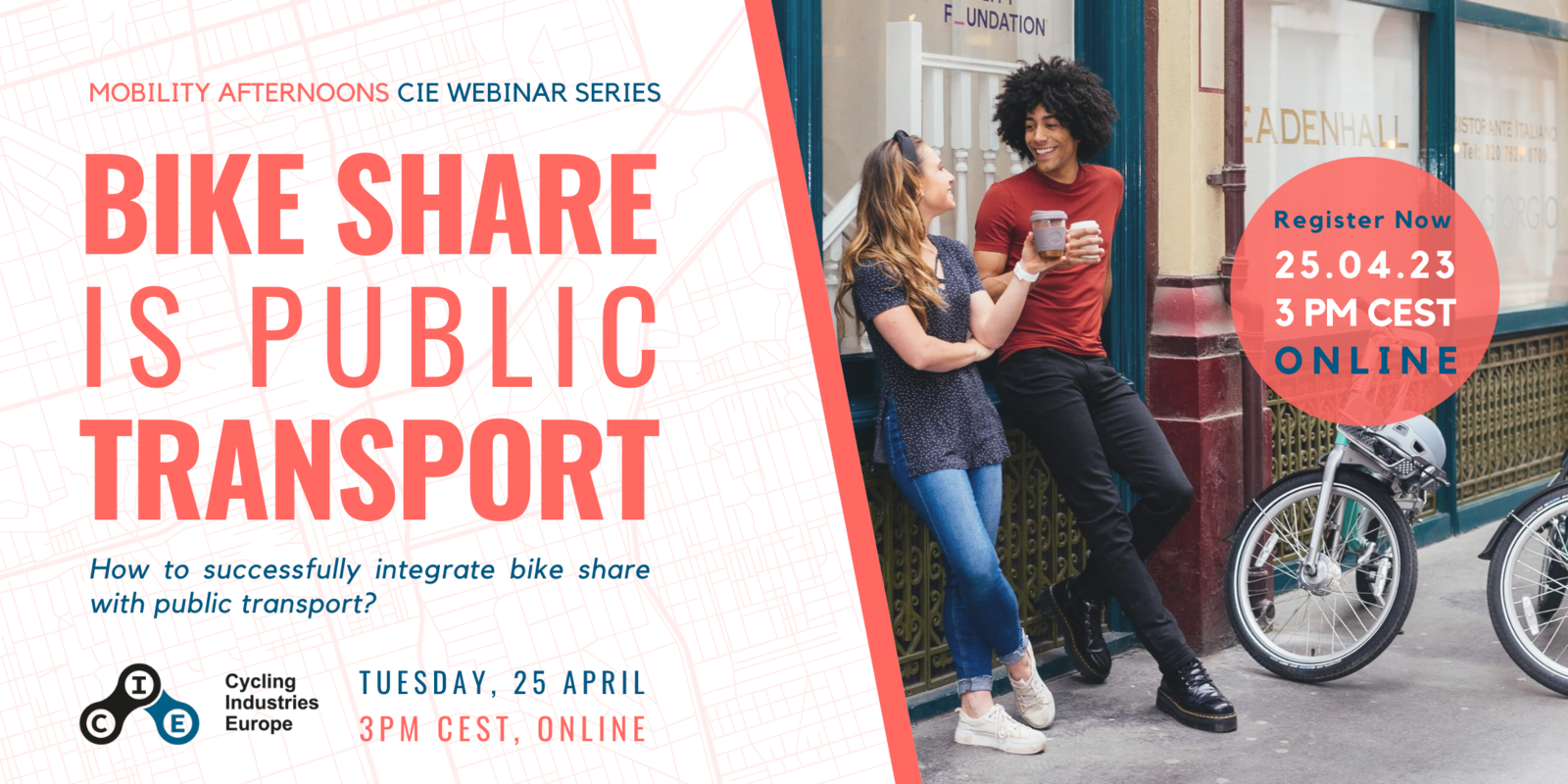CIE's Bike Share Expert Group launched its new Mobility Afternoons Webinar Series on 25 April with the first edition, Bike share is public transport – How to successfully integrate bike share with public transport.
The webinar was moderated by Sébastien Marteau of Fluctuoand in the panel we had Petra Söderqvist from DG MOVE, European Commission, Jérôme Journeau, from RATP Smart Systems, Erdem Ovacik, Donkey Republic, Jhon Ramirez Ospina, nextbike by TIER and Juha Pitkänen from Inurba Mobility.
Bike sharing plays an increasingly important role in decarbonising our cities - making them greener and more liveable. It’s a perfect complement to public transport bringing a solution to the first and last mile access to and from public transport stations. It allows seamless travel on its own or as a multimodal partner helping cities to move away from private car use. Furthermore, it enhances inclusivity by providing affordable bikes for everyone. But how can we successfully integrate bike share with public transport? How can we make multimodality work in a way that encourages the use of sustainable modes of transport? And how can we make bike sharing affordable for everyone?
Key takeaways from the webinar:
- More than 2.5 million trips were made on shared bikes in 100 cities in Europe in 2022, representing a 34% increase in year-on-year ridership compared to 2021 (source: Fluctuo).
- To move away from private car use bike sharing has to be integrated more completely with public transport, especially if we aim to cover first and last mile access to public transport. Studies show that fewer people will choose to take public transport if the distance from a tram, train, or bus stop is more than 400 meters. In these situations, it is crucial that bikes are available.
- For successful Mobility as Service (MaaS) the following points need to be considered:
- Physical integration: Bikes need to be in the vicinity of the public transport stop or station exit, no more than 100 meters away.
- Digital integration: One app performs much better in recruiting riders than a multiplicity of apps. Downloading, registering, inserting payment information create barriers for the user.
- Pricing: Bike sharing needs to be affordable, and this requires public subsidies.
- Reliability: Enough bikes need to be available. If the climate friendly option is available, people will use it.
- Some success factors of making bike share part of public transport:
- In Helsinki, the metropolitan public transport authority provides the customer interface also for the city bikes, including website, application, communication and marketing. There is close cooperation between private and public actors with regular monthly meetings. More than 70% of city bike users connect their trips to another mode of public transport.
- In German cities, with a PT ticket you will get free bike share for 6 minutes, in advantageous options even for 30 minutes. Full integration is not limited to infrastructure, system and tariff but also extends to joint marketing, branding and ticketing.
- French RATP Smart Systems employs a user-centric approach that factors in location and infrastructure. Efficient communication is the key to this integration strategy (for example advice on where to find a bike when exiting a train).
- The EU is working to adopt two key pieces of legislation related to multimodal travel. One revision of the Multimodal Travel Information Services (MMTIS) regulation is to make it mandatory to share real time data.
- Planning and buying tickets for trips combining different means of transport can be difficult within the EU. That is why the European Commission is working on a legislative proposal on multimodal digital mobility services (MDMS) such as route-planners or ticket vendors that help to compare travel options. The new MDMS regulation also includes guidelines for the Member States to promote cycling and walking.
- Bike sharing complements public transport because it is flexible where public transport is not. Bike sharing helps PT to cover areas, locations, and user groups that it would otherwise not reach. Last mile access to PT is a key factor for social inclusion in certain areas. Bike share is not a competitor, but a supporter of PT.
- Bike sharing is an opportunity to be active and brings key benefits to society in the form of reduced public health costs, decreased traffic and congestion, and lower emissions. According to a recent study, each kilometre ridden represents an economic gain of €1.3. Bike sharing should therefore be subsidised.
Missed our webinar? No worries, you can watch it here, and access the speaker presentations here.
Stay tuned for the next edition on Wednesday, 28 June at 3PM CEST, where our bike share experts will be exploring data and integrability.
Interested in becoming a member of CIE’s Bike Share Expert Group? Contact us for more details.
Share on Linkedin Share on Facebook Share on Twitter Subscribe to our newsletter